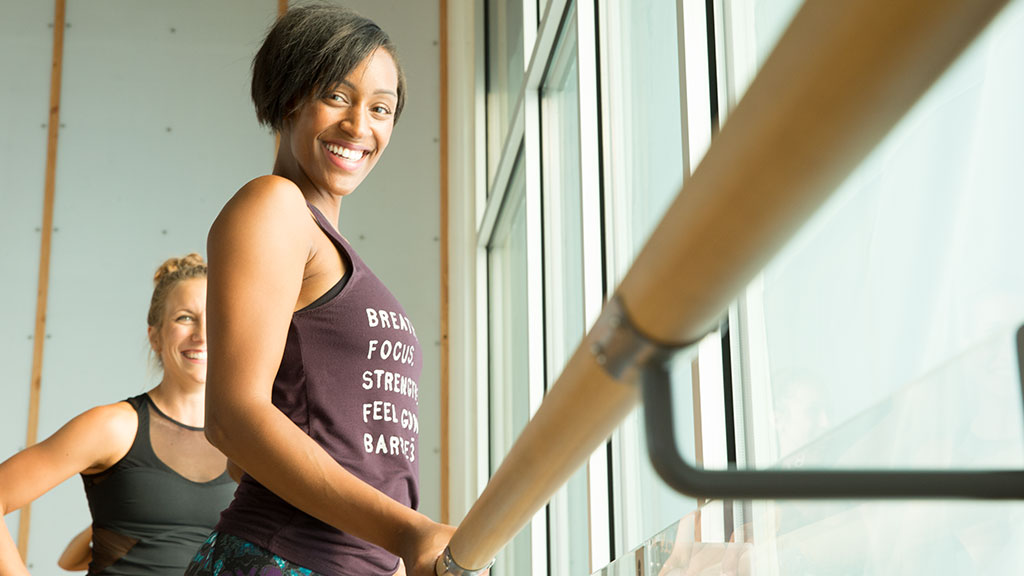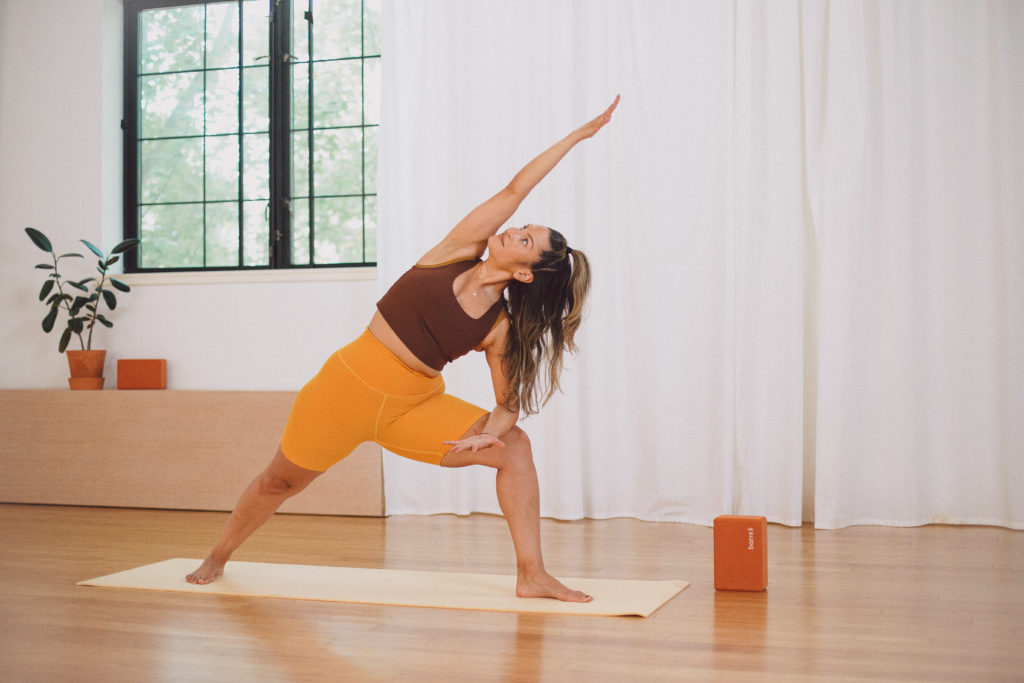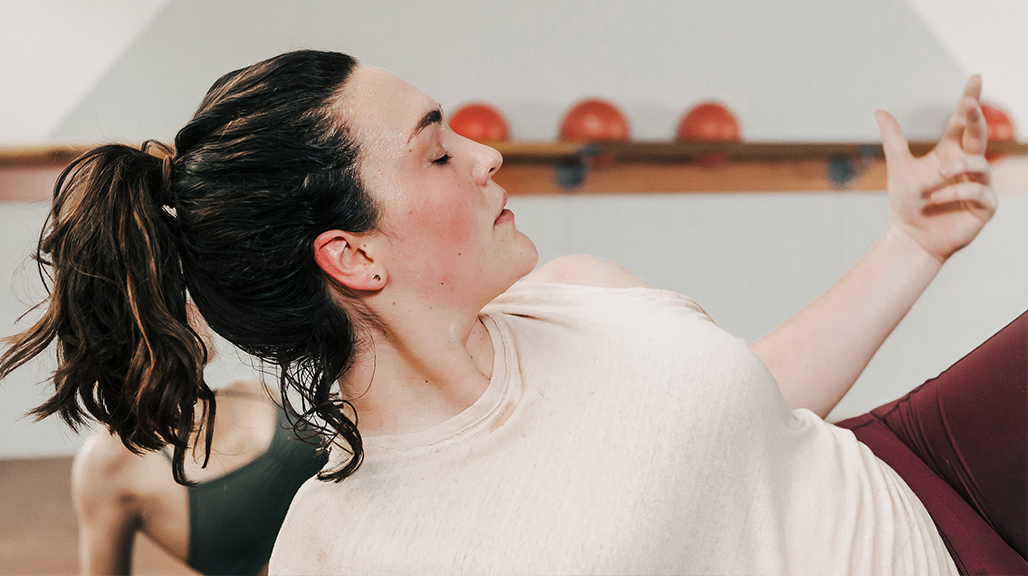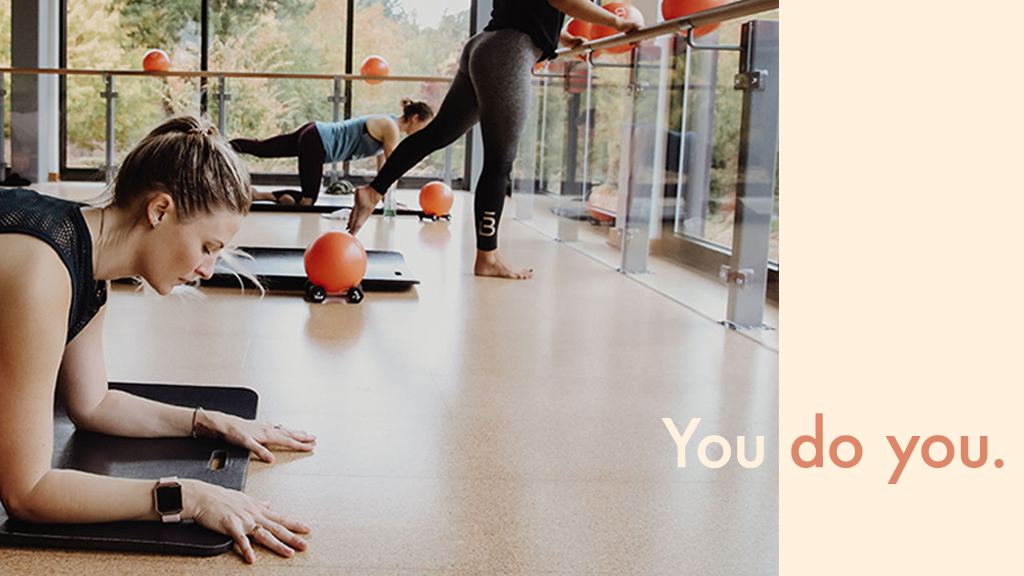Connect
Beyond the Barre: Letting Go of Expectations
Barre3 Felida instructor Porsha Bay was barely four months postpartum when she did her first Challenge, but that didn’t stop her. A lifelong athlete with a competitive spirit, she was sure she’d go full-throttle in classic “Porsha” style. But her body had other plans. Read on to find out how she embraced her struggles and came out not just stronger than ever, but wiser, too. Here’s Porsha in her own words.

Have your expectations ever set you up for disappointment? Going into my first barre3 Challenge last year, I was brimming with excitement. I had just been certified as an instructor a week earlier and had jumped right into teaching classes. At just over four months postpartum, I was ready to go turbo for the Challenge and prove how strong I was—or so I thought.
During my first Challenge class, I got down on the floor to do Plank, and reality hit hard. The position wasn’t just challenging for me—it was impossible. I had abdominal separation from my pregnancy, and I simply didn’t have the strength in my core to make it happen.
My first instinct, honestly, was to force it. That’s what the old Porsha would have done, and it’s what I felt the clients expected of me as an instructor. I’ve always been an athlete: I played basketball and volleyball for years, and I’ve been dancing since before I can remember. I’m competitive by nature, and I strive to excel. When something is challenging, I power through—but this time I simply couldn’t.
I’ll be honest: I hated this moment. I felt like I didn’t know my body anymore and couldn’t trust it to do what I asked of it—and that feeling was totally foreign to me. I wanted to disappear. Instead, I checked my ego, got up off the floor, and took Plank at the barre. And you know what? I connected to my core. I don’t want to pretend everything was solved right then and there. I could tell I had a lot of work to do to build back strength, but it was a start—and one that was safe for my body.
Those first few weeks of the Challenge I modified Plank, Boat Pose, Knee Catches—pretty much every posture that targeted the core. Legwork and some glute work was tough for me, too, because my hips were a bit off from the pregnancy. When the rest of the class went into Horse Pose, I sometimes took Sumo instead. When they powered through Carousel Horse, I took Power Leg, which helped my hips stay more aligned. It still took a huge amount of patience for me to dial everything back, but that’s where the support of everyone in the studio saved me. Amy Grabenkort, our studio owner, was especially amazing. She just kept assuring me that rebuilding my body would go so much better if I embraced my limitations and modified.
She was right. I did two classes that first week of the Challenge, and after that I went to class every day but Sunday. I focused on listening to my body and paying attention to how it felt each day. I learned to push myself just enough to grow in my practice without overdoing it.
I realized that as I let go of my expectations of myself during classes, I started to feel more present and find more joy—not just during my workouts, but in my day-to-day life, too. Being more accepting of my post-baby body helped me feel less attached to outcomes and more present for the process. I wasn’t working out to get a sixpack, I was working out to get stronger. I wasn’t eating to drop the baby weight, I was eating to nourish my body. My goal wasn’t to look good, it was to feel good.
For someone who’s always been focused on the “win,” focusing on the “now” was a new world. And the irony is, I did win—not just in my journey with my body, but in my journey as an instructor, too. When I see a client grimacing while in a posture, I encourage a modification. When I watch a new mom’s face blanche as she tries Plank, I bring her to the barre. I’ve been at that crossroads and made it to the next step, and I’m here to show them that they will, too. Expectations can be motivators, but they can also be blinders, blocking us off from what the world is trying to tell us. If you find that yours aren’t serving you, try letting them go. Chances are, you’ll feel lighter, less stressed, and, ultimately, stronger.
Inspired by Porsha’s story? Take a studio class or sign up for barre3 Online today.
Barre3 Felida instructor Porsha Bay was barely four months postpartum when she did her first Challenge, but that didn’t stop her. A lifelong athlete with a competitive spirit, she was sure she’d go full-throttle in classic “Porsha” style. But her body had other plans. Read on to find out how she embraced her struggles and came out not just stronger than ever, but wiser, too. Here’s Porsha in her own words.

Have your expectations ever set you up for disappointment? Going into my first barre3 Challenge last year, I was brimming with excitement. I had just been certified as an instructor a week earlier and had jumped right into teaching classes. At just over four months postpartum, I was ready to go turbo for the Challenge and prove how strong I was—or so I thought.
During my first Challenge class, I got down on the floor to do Plank, and reality hit hard. The position wasn’t just challenging for me—it was impossible. I had abdominal separation from my pregnancy, and I simply didn’t have the strength in my core to make it happen.
My first instinct, honestly, was to force it. That’s what the old Porsha would have done, and it’s what I felt the clients expected of me as an instructor. I’ve always been an athlete: I played basketball and volleyball for years, and I’ve been dancing since before I can remember. I’m competitive by nature, and I strive to excel. When something is challenging, I power through—but this time I simply couldn’t.
I’ll be honest: I hated this moment. I felt like I didn’t know my body anymore and couldn’t trust it to do what I asked of it—and that feeling was totally foreign to me. I wanted to disappear. Instead, I checked my ego, got up off the floor, and took Plank at the barre. And you know what? I connected to my core. I don’t want to pretend everything was solved right then and there. I could tell I had a lot of work to do to build back strength, but it was a start—and one that was safe for my body.
Those first few weeks of the Challenge I modified Plank, Boat Pose, Knee Catches—pretty much every posture that targeted the core. Legwork and some glute work was tough for me, too, because my hips were a bit off from the pregnancy. When the rest of the class went into Horse Pose, I sometimes took Sumo instead. When they powered through Carousel Horse, I took Power Leg, which helped my hips stay more aligned. It still took a huge amount of patience for me to dial everything back, but that’s where the support of everyone in the studio saved me. Amy Grabenkort, our studio owner, was especially amazing. She just kept assuring me that rebuilding my body would go so much better if I embraced my limitations and modified.
She was right. I did two classes that first week of the Challenge, and after that I went to class every day but Sunday. I focused on listening to my body and paying attention to how it felt each day. I learned to push myself just enough to grow in my practice without overdoing it.
I realized that as I let go of my expectations of myself during classes, I started to feel more present and find more joy—not just during my workouts, but in my day-to-day life, too. Being more accepting of my post-baby body helped me feel less attached to outcomes and more present for the process. I wasn’t working out to get a sixpack, I was working out to get stronger. I wasn’t eating to drop the baby weight, I was eating to nourish my body. My goal wasn’t to look good, it was to feel good.
For someone who’s always been focused on the “win,” focusing on the “now” was a new world. And the irony is, I did win—not just in my journey with my body, but in my journey as an instructor, too. When I see a client grimacing while in a posture, I encourage a modification. When I watch a new mom’s face blanche as she tries Plank, I bring her to the barre. I’ve been at that crossroads and made it to the next step, and I’m here to show them that they will, too. Expectations can be motivators, but they can also be blinders, blocking us off from what the world is trying to tell us. If you find that yours aren’t serving you, try letting them go. Chances are, you’ll feel lighter, less stressed, and, ultimately, stronger.
Inspired by Porsha’s story? Take a studio class or sign up for barre3 Online today.
![]()










9 people have left a comment. Join the conversation!
View Comments